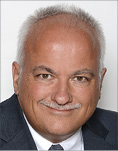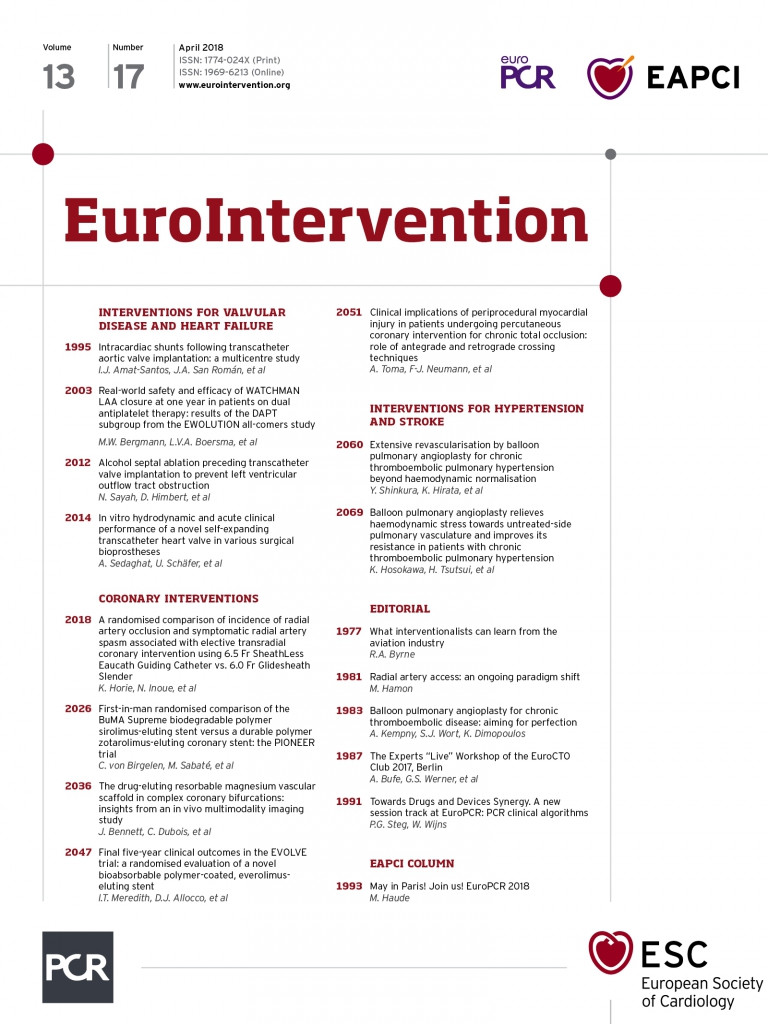
With the year progressing quickly and May soon upon us, I want to take this opportunity to invite you all – if you haven’t made your plans already – to join us at the official scientific meeting of the EAPCI, EuroPCR, which will be taking place at the Palais des Congrès in Paris from 22 to 25 May.
There is little to add that is not already universally acknowledged about this dynamic and trend-setting Course. It has become an indispensable annual rendezvous for all our profession, a point in time and space when all the different aspects and concerns of our speciality intersect, a privileged moment openly and freely to exchange with our peers the latest news and, more importantly, the latest insights into how we practise interventional medicine today. EuroPCR is the theatre for a vast number of activities that take place each year – from the annual meeting of our association (this year witnessing the changing of Presidents, but more about that next month) to the training sessions and hands-on demonstrations of technique, to the live case broadcasts from leading centres throughout the world… I could go on, but I think we are all aware of the dimensions of the official scientific meeting of our association and why we should all participate.
The Course is never a static affair and each year holds its special surprises. Some are due to evolutions in our devices, or insights into the care we offer or the healthcare systems in which we work. Others reflect our expanding knowledge in such topics as valvular therapy or ischaemic stroke or, as last year, an opportunity to explore the history of our profession.
In 2017, we didn’t just celebrate the 40 years of PCI, but began what we feel is a major evolution in the type of education we offer to Fellows. At the initiative of the EAPCI’s New Initiatives For Young Interventionists Committee, the EAPCI Fellows Course, which had previously taken place outside of the EuroPCR meeting, became an integral part of EuroPCR itself. This change in timing and the subsequent integration within the meeting brought with it numerous possibilities, allowing specially focused sessions designed by and for the young specialists and permitting us to highlight which sessions and symposiums during the main programme were relevant for these Fellows.
We must never forget that our ultimate goal in improving medical care for all requires the highest level of education, outreach and the ability to create – and sustain – communities. To do this, we need to have a high level of coordination, confidence and trust among all the different players involved in providing healthcare today. Nurses and allied health professionals, engineers developing new and innovative devices, government regulatory bodies and national societies along with our industry partners all play a concerted part in the success of the whole.
One of the aspects that makes a Course such as EuroPCR accessible and sustainable is financing. An example of this can be seen in the activities of the Fellows Course which received generous educational grants provided by industry sponsors. This year, independent funding by industry has evolved, becoming more transparent and continuing as an ethical process. MedTech Europe, the official trade association that represents the European medical technology industry remains “fully committed to support independent medical education” and has developed a code of practice, which took effect on 1 January to govern their relationship to CME, allowing them to “safeguard and protect” their “relationship with healthcare professionals by adopting a clear and strict self-regulation… through independent third-parties”. EuroPCR and the EAPCI are such parties, and are pleased to continue in our traditional role of providing information – and education – to any and all of our members.
Working together, the EAPCI is proud of the success and evolution of EuroPCR and the quality of the education we can offer. The success of individual aspects of our work, like the Fellows programme, underlines what we can accomplish by committing ourselves to a free exchange of experience and ideas. The actions of our association and the work of the Course support the sharing of clinical knowledge, provide a foundation for innovation and offer opportunities for advancement in the practice of our speciality for all those wishing to participate – whether a student, a young fellow beginning their professional career, or the more accomplished specialists and healthcare providers among us.

